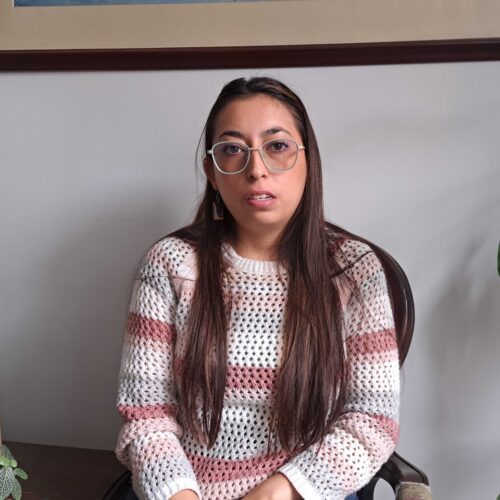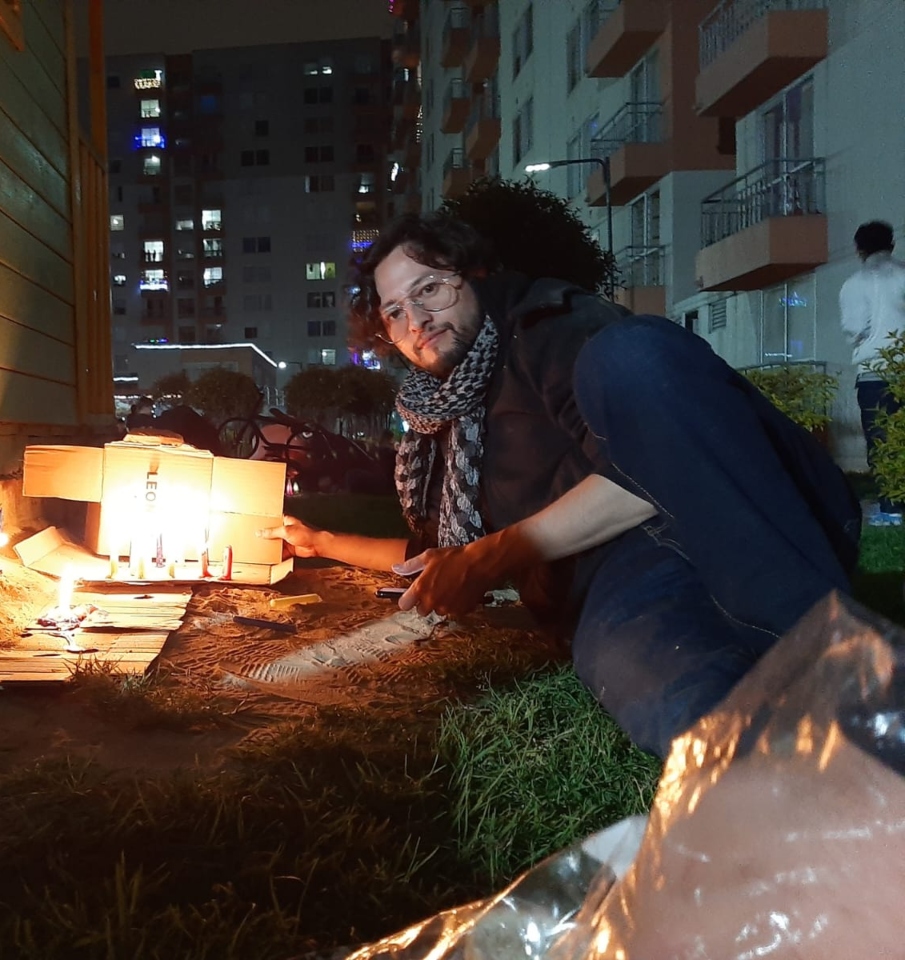Venezuela detains Colombian humanitarian worker on alleged mercenary ties, family denies claims
With tears in my eyes, I sat down in desperation, my voice cracking. Anxiety gripped me as I cried uncontrollably. That night, I found myself unable to sleep. I prayed for my brother but refrained from telling my father. I wanted to shield him while I worked through the details. However, the next morning at 6;00 a.m., I could no longer hide the news.
- 1 year ago
November 19, 2024

BOGOTA, Colombia — On September 14, 2024, my brother Alejandro received a request from his employer the Danish Refugee Council (DRC) out of Colombia. They assigned him to collaborate with the team in Guasdualito, Venezuela. My brother departed from Bogotá and traveled to Arauca [in northeastern Colombia, on the border of Venezuela].
In Arauca, Alejandro met his colleagues to cross the border together. Initially, everything seemed normal. However, complications emerged when an issue with his passport triggered an alert. Around 2:00 p.m., according to my brother’s coworkers, the General Directorate of Military Counterintelligence (DGCIM) in Venezuela detained him. He has been in their custody ever since. Meanwhile, we desperately seek answers.
Read more stories from Venezuela at Orato World Media.
Father breaks down when he hears of his son’s detainment
Initially, Alejandro’s coworkers assumed the detainment constituted routine procedure. However, the situation grew more concerning around 7:00 p.m. when officials at the Guasdualito office requested Alejandro’s belongings. His coworkers handed over his bags but remained in the dark about what was happening. The authorities provided no additional information. The last time they saw Alejandro, he signaled his well-being with a small wave while officials moved him between offices.
At the same time, the coworker responsible for the NGO staff’s security contacted me. As Alejandro’s emergency contact, he messaged me on WhatsApp, providing basic information about Alejandro’s detention at a Venezuelan migration post. At 11:00 p.m., the coworker confirmed my worst fear. Alejandro remained in detention in Venezuela. He detailed the timeline of events and confirmed authorities detained Alejandro at the DGCIM post in Guasdualito. Shortly after, he assured me they were actively monitoring the situation.
With tears in my eyes, I sat down in desperation, my voice cracking. Anxiety gripped me as I cried uncontrollably. That night, I found myself unable to sleep. I prayed for my brother but refrained from telling my father. I wanted to shield him while I worked through the details. However, the next morning at 6:00 a.m., I could no longer hide the news. When I told my father the Venezuelan authorities detained his son, he burst into tears. Worry washed over him.
That morning, I promptly contacted the Danish Refugee Council in Venezuela to inquire about my brother’s well-being. I desperation, I asked what happened and what they knew, along with many other questions. Being a Saturday, it seemed no one could help me. Sunday also lacked any swift action but I did file the case with the Colombian Foreign Ministry through their virtual portal.
Authorities provide no updates about detained NGO worker
Hours passed as I rubbed my hands, feeling increasingly upset. On Monday, September 16, 2024, I received a notification from the state of Mérida in Venezuela. They informed me they could not handle my brother’s case. I quickly followed up with the Foreign Ministry. This time, they referred the case to a consulate with the help of some nationals.
Through Alejandro’s colleagues, I contacted the consulate in Amparo, Apure, located on the border between Colombia and Venezuela. They began processing my brother’s case. Without additional information, I needed options to know what happened to him. At that point, I focused solely on uncovering details I could find about my brother.


During this period of uncertainty, I maintained contact with Alejandro’s coworkers, who waited outside the DGCIM office in Guasdualito. They tried to gather information about him but none of the authorities offered any updates. As a family member, they offered me no access to any details. Unable to go to Venezuela, I relied entirely on the NGO and their efforts. Repeatedly, my brother’s colleagues demanded information from the Venezuelan authorities, to no avail.
Eventually, a colleague informed me the authorities took my brother to Caracas. Since it wasn’t an official communication, the news left me feeling uncertain about its authenticity. Without an official statement, I wondered if the DGCIM office simply wanted to quell the persistent questions and compel my brother’s coworkers to leave. We all felt confused. Was Alejandro in Guasdualito? Was he transferred to Caracas, or was he somewhere else entirely?
My brother has no vices. He worked from home and never left the country. For three years, he dedicated himself to the Danish Refugee Council, beginning as an assistant and advancing to the role of information management officer. His work never involved direct contact with people or beneficiaries. He mainly worked with Excel and the organization’s applications. This was actually his first time traveling abroad.
Venezuela labels Alejandro a mercenary; sister fights to clear his name
On October 18, 2024, the NGO issued a public statement. They confirmed my brother’s detention and asserted that he was working in Venezuela solely for NGO-related activities. Despite this statement, the Venezuelan Minister of the Interior Diosdado Cabello falsely accused my brother of being a mercenary. He claimed Alejandro recruits paramilitary groups while posing as an NGO worker. Undoubtedly, this accusation is completely false.
My brother is a humanitarian worker with no connection to illegal groups. He went to Venezuela to conduct trainings with his colleagues. In response to the accusations, I sought help from congressmen, governors, foundations, and anyone else who could assist us. I met with the directors of the DRC in both Venezuela and Colombia, as well as the regional director here in Colombia. Tirelessly, they continue working to find ways to contact my brother and secure his release.
These individuals remain attentive, doing everything they can to resolve this issue quickly. However, when Venezuelan authorities called my brother a mercenary, I collapsed. I feel terrified the Venezuelan government will falsely charge him. In the absence of hope, I keep asking myself, “What can I do? Where do I go from here? How can I help him when I am stuck here, and I lack any information about his whereabouts?” My father feels similarly afraid.
We do know the Venezuelan national government acknowledges detaining my brother. That tiny bit of news feels like a small bit light of breaking through. In Colombia, I began pushing for press coverage to clear my brother’s name and clarify his role. People need to understand who he truly is and what he does; that he never served as a paramilitary recruiter. In the midst of all this, we live in constant anxiety. I worry about Alejandro’s health. Sleep eludes me knowing someone I love is out there. I cannot rest until I know he is safe.
It feels as though we have achieved nothing. I filed the case with the Colombian Prosecutor’s Office but we see no progress. We remain in touch with the High Commissioner for Human Rights, the DRC, and the consulate, but information remains nonexistent. Grief overwhelms me. Even if I went to Venezuela, where would I go and what would I do? My father wants to make the trip but worries what might happen to him if he shows up. We wonder, would they even let us enter?
Sister vows to defend Alejandro as false narrative and government silence leave family in despair
Alejandro is a vital part of my small family which includes my dad, brother, and me. My mother passed away 11 months ago from cancer, which already made everything harder for us. The harrowing situation with my brother added complexity to an already difficult time. Alejandro is an industrial engineer. He studied at the National University of Colombia and later pursued education and environmental management at the District University of Bogotá.
At home, he enjoys riding bikes and playing sports. We frequently watch movies and anime together. While spending time with friends, he avoids drinking, dislikes beer, and does not smoke. Without a doubt, he is not a mercenary; he is an intelligent person. I urge the Venezuelan government to share information about my brother, where he is, and how he is doing. I kindly ask them to allow me to contact him and, if possible, clarify his situation using the documents provided by the DRC.
In addition, I call on the Colombian government to keep pushing for answers, as that is all I have left. Relentlessly, I press the case with the Minister of Foreign Affairs and the Presidency, determined to find help. As my choices dwindle, Colombia must rise to defend and support its citizens. Alejandro is a homebody who is ambitious and dedicated to his studies and profession. Now, a completely false narrative surrounds him. It devastates me, overwhelming me with sorrow.
His friends reveal their deep concern, with worry on their faces. Although the ambassador sent diplomatic notes to uncover more about my brother’s situation, no one provided any answers. I fear for my brother’s fate, worrying he may be charged falsely. If that happens, I want to provide him with a defense and an advisor to protect his rights.



































































































































































































































































































































































































































































